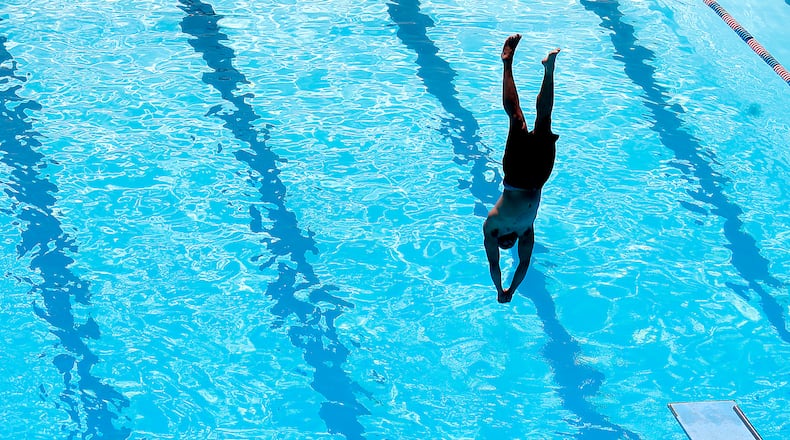“(We want) to make sure that you are getting out and enjoying yourself but in the safest way possible,” said Chris Cook, assistant health commissioner.
Swim safely
To avoid pool-related accidents and drownings in pools or other bodies of water, parents should make sure their children are wearing brightly colored swimsuits and avoid the color blue, Seibert said.
“Blue is the same color as the pool lining, so a lot of times if there is a child that’s drowning, it’s very hard for you to know,” Seibert said.
Guardians should keep an eye on their children even if lifeguards are present, and no one should run by the pool, Cook said.
Parents should not allow sick kids to swim in the pool, and swim diapers must be checked at least once every hour to prevent feces from entering the water and causing a parasitical or bacterial outbreak, Cook said.
People with pools at home should also ensure the correct concentration of pool chemicals, and handle chlorine with gloves and according to instructions, Cook said. He said there are about 4,500 chlorine-related emergency room visits in the U.S. per year.
Protect against the sun
One of the most important things to protect against when outdoors, particularly in the summer, is sunburn and skin cancer, Cook said.
Ashley Seibert, a health planner at the CCCHD, said individuals can protect against the sun by wearing wide-brimmed hats, sunglasses and broad-spectrum sunscreen with an SPF of 15 or more. She said sunscreen should be reapplied about every two hours and after swimming, sweating and toweling off.
Sunscreen, like other products, has a set shelf life and should not be stored in extreme temperatures, so expiration dates should be followed to ensure the use of a working sunscreen, Cook said. Everyone should use sunscreen for any amount of sun exposure.
“Even in one hour, exposure can really do some damages if you’re not careful, especially if you have some family history (of skin cancer),” Cook said.
Seibert said anyone who exposes their scalp to the sun should apply sunscreen there or wear a hat.
Warning signs of skin cancer
Seibert said moles on the body should be monitored for melanoma with the ABCDEs: asymmetry of the sides of a mole, borders that are uneven, color varieties, diameter growing larger than a pencil eraser and evolution over time. Any concerning moles should be checked out by a dermatologist.
Fairer skinned people are more likely to develop skin cancer, but it is a potential for everyone, Seibert said.
Avoid heat exhaustion and stroke
With rising temperatures and more people spending time outside, it’s important to take precautions against and be aware of the signs of heat stroke and exhaustion, Cook said.
Heat exhaustion is the body’s response to a large loss of water and salt, usually through sweating, according to the Centers for Disease Control and Prevention. Heat stroke occurs after heat fatigue, happening when the body cannot control its temperature, leading to a rapid temperature increase, the inability to sweat and inability to cool down.
Warning signs of heat exhaustion include heavy sweating, an ill feeling, muscle cramps, fatigue, weakness, dizziness, headache and upset stomach, Seibert said. Cook said anyone experiencing this symptoms should try to bring their temperature down and should seek medical attention if the symptoms persist longer than an hour.
Symptoms of heat stroke include hot and dry skin, upset stomach, confusion and loss of consciousness. Anyone suspected of having heat stroke needs medical attention immediately. While waiting for emergency care, people nearby should try to cool the person off with cool water from washcloths, sponges, a shower or a hose.
About the Author
